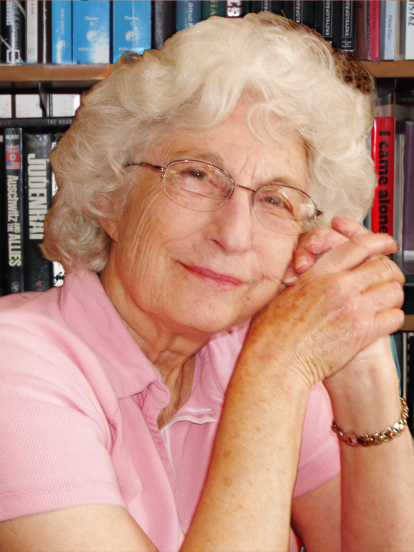———————–Sarah Traister Moskovitz————————–
I write in Yiddish because I love the language, its rich possibilities for intimacy remembrance and humor. I warm to its strong and tender sound. To tap that deep core in me where my Yiddish voice lives is the best way I know to honor its vitality, protest the genocide of millions of its speakers and rail against its having been treated as a step-child in Israel. When I write in Yiddish I restore the bond between myself and my murdered family in Poland and all my people whose daily language it was. When I write in Yiddish I contribute to the living river.
I am the daughter of Polish Jewish immigrants to America in the 1920s. I am the niece of aunts and uncles and the cousin of those left behind who were killed in Warsaw, Biala Podlaska, Treblinke and Babi Yar in the 1940s. My father, Yitzkhok Traister, dedicated his life to Yiddish. For over forty five years he was a principal and teacher in the Workmen Circle schools in Springfield Mass and Los Angeles.
I followed in his footsteps by also becoming a teacher and scholar of Human Development. My mother’s influence on my work as a psychotherapist is also profound. She was orphaned young and encouraged me to have a career when it was not popular for women to do so. Wise but without formal education, she said “fun yedn eynem menchn ken men epes lernen.” (There is something to be learned from every single person). She took care of little Dvorale, our first daughter, to enable me to do student teaching. I graduated with a BA and a Kindergarten Teaching Credential from Los Angeles City College in 1952. Later after working as a teacher received a Masters degree in Psychology from Los Angeles State College in 1958 and a Ph. D. from Yeshiva University in New York in 1970.
My profound interest in children, orphans and Holocaust Survivors came together in 1977 when as a Visiting Professor from Cal. State U. Northridge I spent time at Anna Freud’s Hampstead Clinic, met Alice Goldberger, the matron of the Lingfield Children’s Home for young ones who had survived the Holocaust and came to England after liberation. Meeting Freud and Goldberger was a life changing experience that resulted in the book “Love Despite Hate: Child Survivors of the Holocaust and Their Adult Lives“, published by Shocken in 1982. Research for this book took me around the world to follow up the orphanage alumni in many countries. This book and subsequent video-taping also brought thirty five local child survivors out of isolation and into the first of many organizations of Child Survivors. These organizations now have memberships in the thousands all over the world.
I had not written poetry in Yiddish until 1995 when a poem came to me in Yiddish upon waking up the morning after a Yiddish Poetry seminar with Prof. Avrom Nowersztern from the Hebrew University. This seminar in Malibu was part of Dancing at Two Weddings (Tantzndik Oif Tsvey Khasenes), conceived and organized by Aaron Lansky founder of the National Yiddish Book Center. My creative return to Yiddish was inspired there. It is no accident that the first poem was one of mourning, “Detsember (December)” and the one that followed, an homage to Aaron Lansky was “Yerushe (Legacy)”.
In 2003 with a grant from my University, California State University Northridge and a Visiting Scholar invitation from The United States Holocaust Memorial Museum, I undertook the work of translating the Yiddish poetry that was buried in the Ringelblum Archives in Warsaw during the Holcaust and unearthed after the war in two milk-cans and ten tins. With the devoted and indispensable help of my computer maven husband Itzik, who was able to make some unreadable microfiche frames readable, I have been translating this treasury of poetry from Yiddish to English. Among the poets are well known (to us) great poets, Yitshok Katzenelson and Simkha Shayevitch as well as wonderful poets lesser known to us like Kalman Lis, Miriam Unlinower, Shmuel Marvil and Yosef Kirman, Shmuel Rabon. There are also many poems whose writers are unknown. Al l of the above writers and a staggering number more were killed in that tragic era and many wrote up until they were taken. I feel priviledged to be doing this work, to bring these tragically silenced, vital Yiddish voices to the attention of a wider group of readers.
